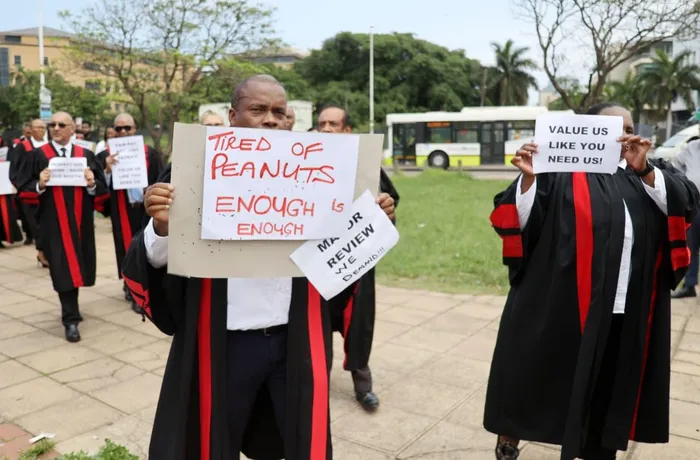
A group of magistrates held a demonstration against systematic discrimination of magistrates and exclusions in the judicial structure and to have the remuneration major review implemented immediately, at the Durban Magistrate's Court. Pictures: Tumi Pakkies/ Independent Newspapers
Image: Tumi Pakkies
In a powerful demonstration of solidarity, magistrates in Durban took to the streets on Monday, advocating for judicial independence and addressing what they describe as systematic discrimination within the South African judicial system.
The placard-waving magistrates, led by Magistrate Scelo Zuma, who represents the Judicial Officers’ Association of South Africa (Joasa), highlighted ongoing concerns that have long been ignored by those in power.
“There is an outstanding, long-standing issue relating to our salaries,” Zuma stated.
He explained that despite annual reports and recommendations made to the president and the Judicial Service Commission, essential changes to their remuneration remain unimplemented.
“This is happening annually. We have tried to litigate. However, our calls and cries are not heeded,” he lamented.
A significant point raised during the protest was the disparity in benefits between magistrates and judges. “We do not have medical aid, housing allowances or vehicle allowances,” Zuma noted as he emphasized the struggle of magistrates who are forced to budget their salaries to cover basic needs amidst mounting pressures, including safety as judicial officers.
As the demonstration unfolded, the sentiments of frustration were echoed by other magistrates. Magistrate Dr Betty Rauheath, with 48 years of experience, expressed deep disappointment that she is set to retire without witnessing improvements, stating, “I’m now 70 and I have to leave, but I feel sad that I have to leave without having seen any changes.”
Magistrate Mondli Nhlangulela, who has served for about seven years, pointed out how their salaries are quickly depleted by mortgage payments and vehicle costs. “If we can be given housing allowance, car allowance and a petrol card, we will be able to breathe,” he urged. He also raised concerns about the integrity of the profession, noting that the current salary structure may induce unethical behaviour due to economic pressures.
In a move that underscores the urgency of their demands, Nhlangulela warned of further action: “For now, we’re just firing the first shot. If the powers that be do not come to the party, then we might have to disturb the operation of the court.” His message was clear: “They must pay us our dues, because there have been about three reports on the payment structure, but none have been implemented.”
Advocate Francois Botes SC provided insight into the role of the Magistrates Commission, stating that any dissatisfaction regarding working conditions or remuneration should be formally raised with them. He remarked, “If all of that fails, well, then a court application must be initiated to the High Court.”
The current wave of protests is not an isolated event but a strategic move by magistrates across the country to seek recognition and fairness. Zuma concluded with a resolute call for action, affirming that they will continue to stand united until their demands are addressed. “It is a dire situation. It is something that, unfortunately, we cannot let go of. It has to be addressed.”
IOL News
Related Topics: